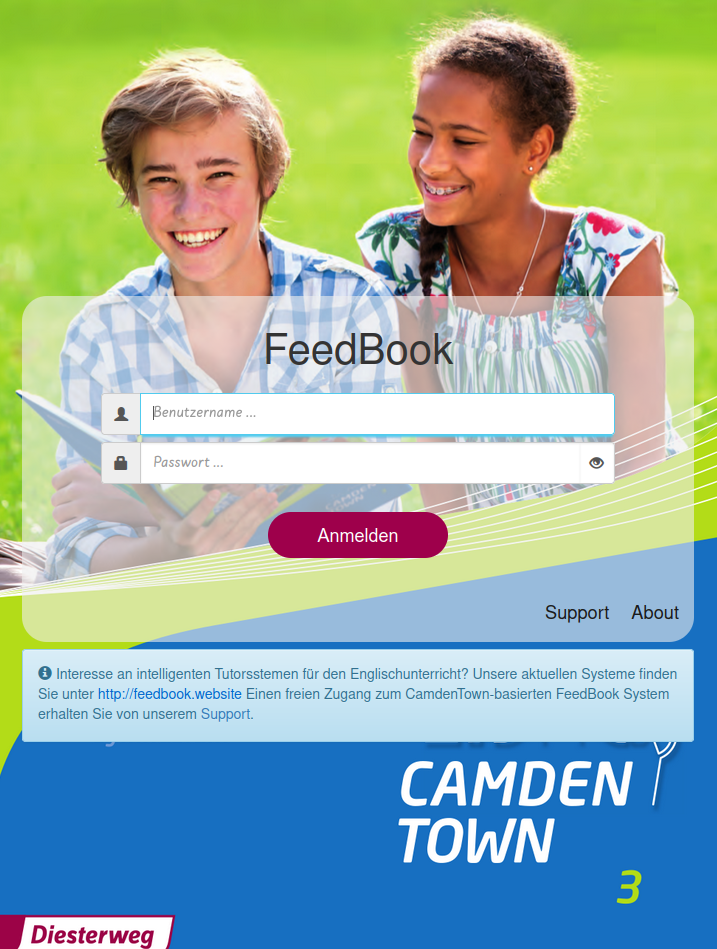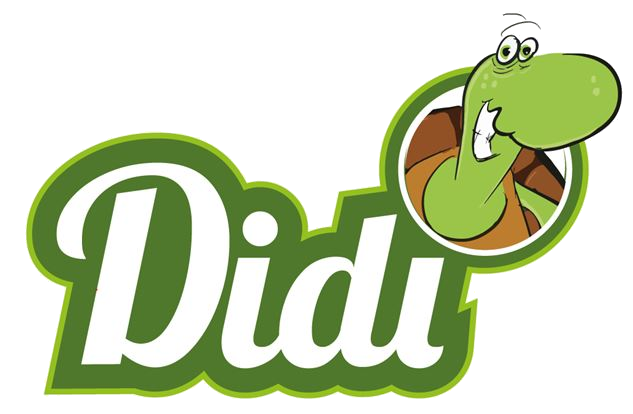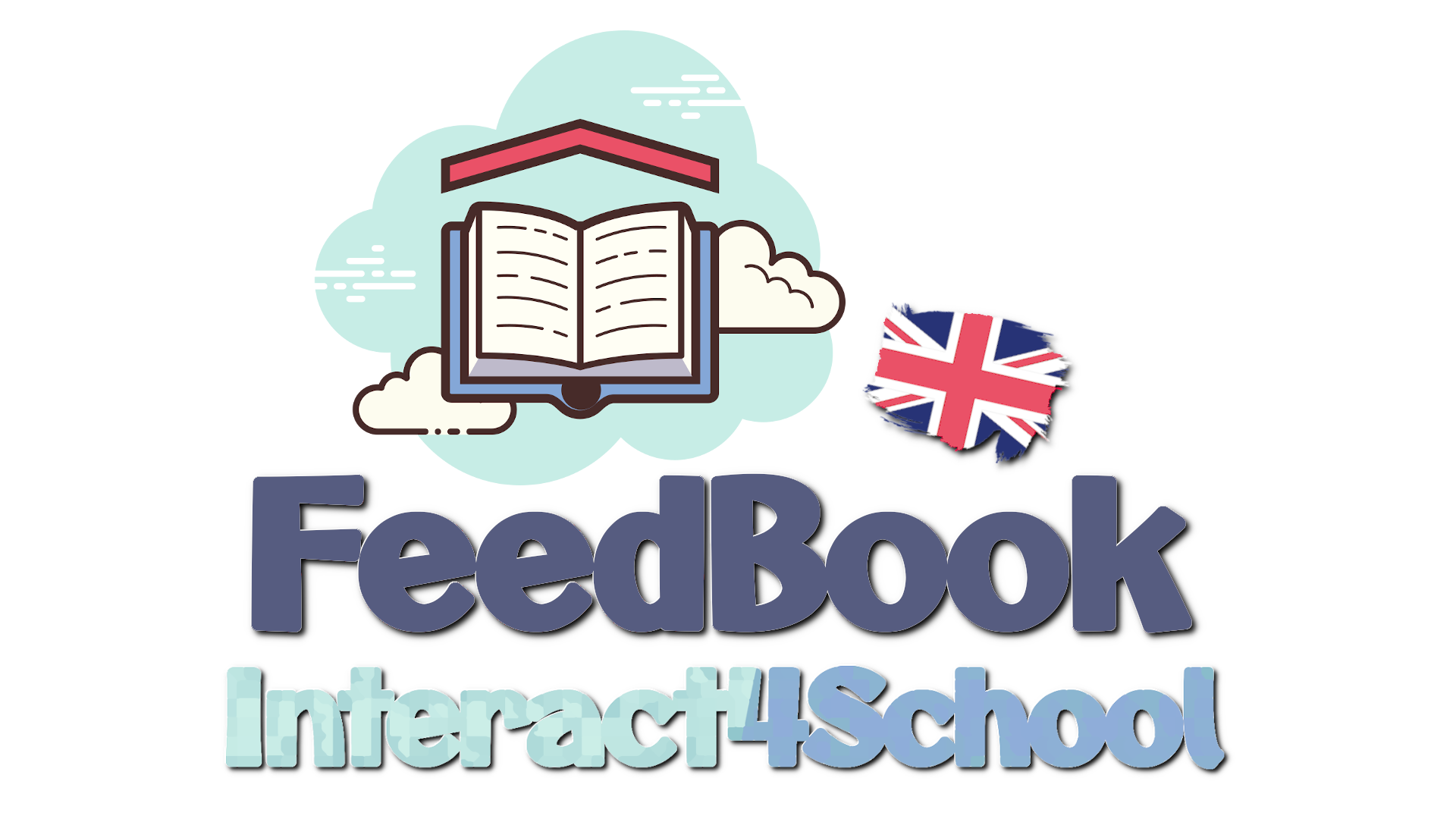FeedBook is an intelligent language tutoring system that provides immediate feedback to students and adaptively proposes activities that fit individual learning paths. The system supports individualized practice that is functionally integrated into a task-based foreign language classroom. To instantiate our general research and development vision, we currently focus on the 7th grade English curriculum in German secondary schools.
The AI2Teach project (2021-2026) introduces an innovative feature to the FeedBook - a teacher dashboard. With the help of the teacher dashboard providing real-time learning analytics and adaptive feedback, the project aims to enhance both personalized student learning and teacher-led instruction, creating a hybrid approach to education.
Tech-Team: Stephen Bodnar, Leona Colling, Walid El Hefny, Kristian Lange, Detmar Meurers, Tanja Schmidt, Mariia Soliar
The AI2Teach project has conducted a Randomized Controlled Trial that focused on training teachers to effectively incorporate AI into classroom teaching. The research examines how teacher training on technology-supported teaching and learning can improve classroom dynamics by enabling educators to use AI-powered tools.
Reference: Berens, F., Wendebourg, K., Kholin, M., Colling, L., Schmidt-Peterson, J., Hopp, M., Heck, T., Bodnar, S., El Hefny, W., Nuxoll, F., Deeg, C., Krey, K., Schrader, J., Schröter, H., Nagengast, B., Meurers, D., Trautwein, U. (2024). AI2Teach: Effectiveness of a teacher training on technology-supported teaching and learning. Pre-registration of the study design. PDF

The original FeedBook project (2016-2019) transformed a printed workbook into an intelligent tutoring system providing immediate feedback to learners. The full-year randomized controlled field study conducted at the end of the project was the first such study conducted in a German school context. It established the effectiveness of the immediate scaffolded feedback in an authentic German classroom setting.
Reference: Meurers, D., De Kuthy, K., Nuxoll, F., Rudzewitz, B., & Ziai, R. (2019). Scaling up intervention studies to investigate real-life foreign language learning in school. Annual Review of Applied Linguistics, 39, 161-188. DOI

DigBinDiff (2019-2023) investigated how digital differentiation and adaptive feedback help students by selecting tasks suited to their individual needs, improving their learning experience.
Reference: Quixal, M., Gawrilow, C., Meurers, D., Rudzewitz, B., Heck, T., & Xiong, Y. (2024). Supporting mastery learning by adapting exercise sequences in English as a foreign language to working memory and learner performance. DOI

The Interact4School project (2020-2023) focused on the integration of motivational feedback and a student dashboard supporting the transparent integration of the individualized practice into a task-oriented foreign language classroom.
Reference: Parrisius, C., Pieronczyk, I., Blume, C., Wendebourg, K., Pili-Moss, D., Assmann, M., ... & Trautwein, U. (2022). Using an intelligent tutoring system within a task-based learning approach in English as a foreign language classes to foster motivation and learning outcome (interact4school): Pre-registration of the study design. DOI
Deininger, H., Parrisius, C., Lavelle-Hill, R., Meurers, D., Trautwein, U., Nagengast, B., & Kasneci, G. (2025). Who did what to succeed? individual differences in which learning behaviors are linked to achievement. In LAK 25: Proceedings of the 15th International Learning Analytics and Knowledge Conference (pp. 771-782). DOI
Holz, H., Wendebourg, K., Pieronczyk, I., Bodnar, S., Meurers, D., Parrisius, C. (2025). Design and User Preferences of Pedagogical Agents for an Intelligent Tutoring System for EFL. In: Smith, B.K., Borge, M. (eds) Learning and Collaboration Technologies. Proceedings of the 27th International Conference on Human-Computer Interaction (HCII). Lecture Notes in Computer Science, vol 15807. Springer, Cham. DOI
Pili-Moss, D., Hamrick, P., Wendebourg, K., Schmidt, T., & Meurers, D. (2025). Implicit statistical learning and working memory predict EFL development and written task outcomes in adolescents. System, 131, 103656. DOI
Schmidt, T. (2025). Towards Adaptive Language Learning Acknowledging Linguistic Variability and Curricular Constraints. Doctoral Thesis. Informatics. University of Tübingen. DOI
Deininger, H., Pieronczyk, I., Parrisius, C., Plumley, R. D., Meurers, D., Kasneci, G., Nagengast, B.,Trautwein, U., Greene, J. A., & Bernacki, M. L. (2024). Using theory-informed learning analytics to understand how homework behavior predicts achievement. Journal of Educational Psychology. DOI
Colling, L., Pieronczyk, I., Parrisius, C., Holz, H., Bodnar, S., Nuxoll, F., & Meurers, D. (2024). Towards Task-Oriented ICALL: A Criterion-Referenced Learner Dashboard Organising Digital Practice. In CSEDU (1) (pp. 668-679). DOI
Heck, T., & Meurers, D. (2024). Exercise parameters influencing exercise difficulty. CALL for all Languages - EUROCALL 2023 Short Papers (pp. 236-241). DOI
Colling, L., Kholin, M., & Meurers, D. (2024). A Learning Analytics Dashboard for K-12 English Teachers-Bridging the Gap Between Student Process Data and Teacher Needs. In Adjunct Proceedings of the 32nd ACM Conference on User Modeling, Adaptation and Personalization (pp. 538-548). DOI
Ruiz, S., Rebuschat, P., Meurers, D. (2024). Supporting Individualized practice through Intelligent CALL. In Y. Suzuki (Ed.), Practice and automatization in second language research: Perspectives from skill acquisition theory and cognitive psychology. Routledge. DOI
Colling, L., Heck, T., & Meurers, D. (2023). Reconciling Adaptivity and Task Orientation in the Student Dashboard of an Intelligent Language Tutoring System. In Proceedings of the 18th Workshop on Innovative Use of NLP for Building Educational Applications (BEA 2023) (pp. 288-299). DOI
Deininger, H., Lavelle-Hill, R., Parrisius, C., Pieronczyk, I., Colling, L., Meurers, D., ... & Kasneci, G. (2023). Can you solve this on the first try?–Understanding exercise field performance in an intelligent tutoring system. In International Conference on Artificial Intelligence in Education (pp. 565-576). Cham: Springer Nature Switzerland. DOI
Heck, T., & Meurers, D. (2023). Exercise generation supporting adaptivity in intelligent tutoring systems. In International Conference on Artificial Intelligence in Education (pp. 659-665). Cham: Springer Nature Switzerland. DOI
Heck, T., & Meurers, D. (2023). Using learning analytics for adaptive exercise generation. In Proceedings of the 18th Workshop on Innovative Use of NLP for Building Educational Applications (BEA 2023) (pp. 44-56). DOI
Heck, T., & Meurers, D. (2023). On the relevance and learner dependence of co-text complexity for exercise difficulty. In Swedish Language Technology Conference and NLP4CALL (pp. 71-84). DOI
Hui, B., Rudzewitz, B., & Meurers, D. (2023). Learning processes in interactive CALL systems: Linking automatic feedback, system logs, and learning outcomes. Language Learning & Technology 27(1), 1–23. URL
Parrisius, C., Pieronczyk, I., Wendebourg, K., Rieger, S., Schmidt, T., Meures, D., ... & Nagengast, B. (2023). Examining Effects of Gamification Elements in an Intelligent Tutoring System for 7th Grade English Learners on Their Motivation–A Randomized Controlled Field Trial (Pre-registration). PDF
Ruiz, S., Rebuschat, P., & Meurers, D. (2023). Supporting Individualized Practice through Intelligent CALL. In Practice and Automatization in Second Language Research (pp. 119-143). Routledge. DOI
Alexopoulou, T., Meurers, D., & Murakami, A. (2022). Big data in SLA: Advances in methodology and analysis. In The Routledge handbook of second language acquisition and technology (pp. 92-106). Routledge. PDF
Heck, T., Meurers, D., & Nuxoll, F. (2022). Automatic exercise generation to support macro-adaptivity in intelligent language tutoring systems. Intelligent CALL, granular systems and learner data: short papers from EUROCALL, 2022, 162-167. DOI
Heck, T., & Meurers, D. (2022). Parametrizable exercise generation from authentic texts: Effectively targeting the language means on the curriculum. In Proceedings of the 17th Workshop on Innovative Use of NLP for Building Educational Applications (BEA 2022) (pp. 154-166). DOI
Parrisius, C., Wendebourg, K., Rieger, S., Loll, I., Pili-Moss, D., Colling, L., ... & Nagengast, B. (2022). Effective Features of Feedback in an Intelligent Tutoring System-A Randomized Controlled Field Trial (Pre-Registration). DOI
Pili-Moss, D., Schmidt, T., Blume, C., Middelanis, L., & Meurers, D. (2022). Enhancing EFL classroom instruction via the FeedBook: effects on language development and communicative language use. Arnbjörnsdóttir, Birna; Bédi, Branislav; Bradley, Linda; Friðriksdóttir, Kolbrún, 328-333. DOI
Schmidt, T., & Strasser, T. (2022). Artificial intelligence in foreign language learning and teaching: a CALL for intelligent practice. Anglistik: International Journal of English Studies, 33(1), 165-184. PDF
Heck, T., Meurers, D., & Bodnar, S. (2021). Automatic generation of form-based grammar exercises from authentic texts. Master's Thesis, University of Tübingen. PDF
Quixal, M., Rudzewitz, B., Bear, E., & Meurers, D. (2021). Automatic annotation of curricular language targets to enrich activity models and support both pedagogy and adaptive systems. Proceedings of the 10th Workshop on Natural Language Processing for Computer Assisted Language Learning (NLP4CALL 2021). Linköping Electronic Conference Proceedings 177: 38–54. PDF
Rudzewitz, B. (2021). Learning Analytics in Intelligent Computer-Assisted Language Learning. Doctoral Thesis, University of Tübingen. DOI
Rudzewitz, B., Ziai, R., Nuxoll, F., De Kuthy, K., & Meurers, D. (2019). Enhancing a Web-based Language Tutoring System with Learning Analytics. In EDM (Workshops) (pp. 1-7). PDF
Ziai, R., Nuxoll, F., De Kuthy, K., Rudzewitz, B., & Meurers, D. (2019). The impact of spelling correction and task context on short answer assessment for intelligent tutoring systems. In Proceedings of the 8th Workshop on NLP for Computer Assisted Language Learning (pp. 93-99). PDF
Rudzewitz, B., Ziai, R., De Kuthy, K., Möller, V., Nuxoll, F., & Meurers, D. (2018). Generating feedback for English foreign language exercises. In Proceedings of the thirteenth workshop on innovative use of NLP for building educational applications (pp. 127-136).DOI
Ziai, R., Rudzewitz, B., De Kuthy, K., Nuxoll, F., & Meurers, D. (2018). Feedback strategies for form and meaning in a real-life language tutoring system. In Proceedings of the 7th workshop on NLP for Computer Assisted Language Learning (pp. 91-98). DOI
Ziai, R. (2018). Short Answer Assessment in Context: The Role of Information Structure. Doctoral Thesis, University of Tübingen. DOI
Rudzewitz, B., Ziai, R., De Kuthy, K., & Meurers, D. (2017). Developing a web-based workbook for English supporting the interaction of students and teachers. In Proceedings of the joint workshop on NLP for Computer Assisted Language Learning and NLP for Language Acquisition (pp. 36-46). DOI